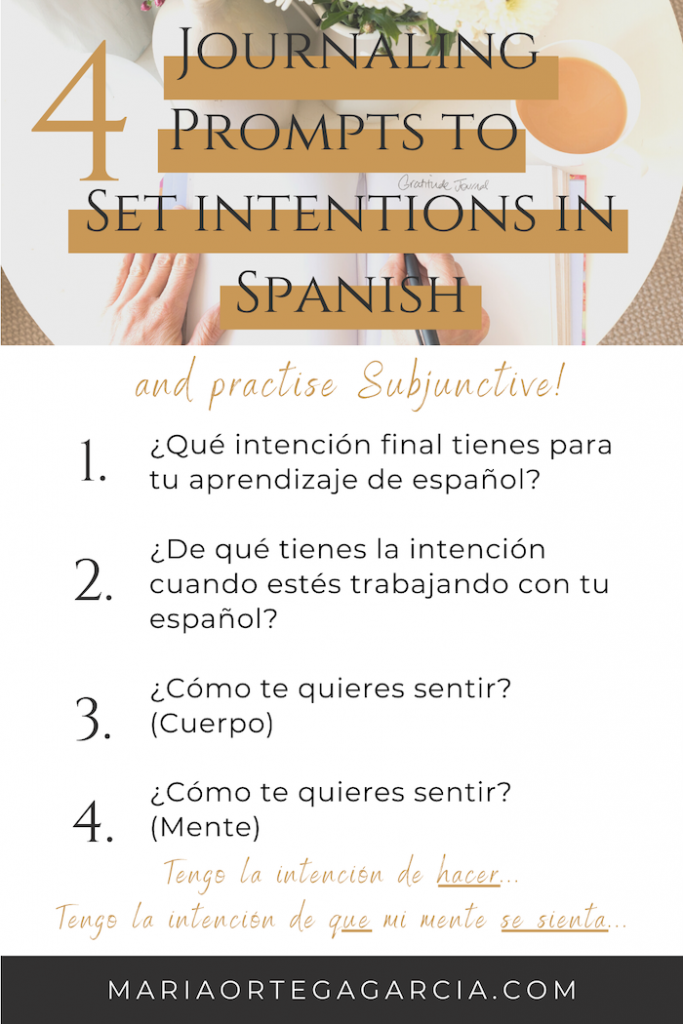
Why setting intentions in Spanish?
Let’s start by laying out the benefits of setting intentions and how you can improve your Spanish (and your life even!) in doing so.
“Intention is one of the most powerful forces there is. What you mean when you do a thing will always determine the outcome.” ~ Brenna Yovanoff
***
“La intención es una de las fuerzas más poderosas que existen. Lo que quieres (de lo que tienes la intención) cuando haces algo siempre determinará el resultado”. ~ Brenna Yovanoff
The reasons for using intention setting in Spanish are two-fold.
First, because setting intentions before starting the day, or your learning practice, for example, is a powerful tool used in neuro-linguistic programming (NLP). When you’re setting intentions you’re creating within yourself a new and specific frame of mind that serves your purpose in that day or that learning practise time. You’ll be amazed at how many resolutions or goals you’ll successfully meet when you consciously base them on your intentions.
Having goals is necessary before you start learning any new skill, but it’s not enough. It’s important to set intentions every time before you start your Spanish practice. Why? Because it connects you with the reason you started in the first place, which in return activates your motivation for learning every time. Also, because it helps you to focus on how you want to feel during the practice which makes it present.
Second, because setting intentions, thinking of and writing a sentence every day before your Spanish practise is already PART OF the practice, as you will be using the complex (but hyper common) Spanish grammar structures in a meaningful way. You will be using the Subjunctive to express intention. And you will soon integrate what the Subjunctive is about. That is, talking about something that is not real (yet) but that lives in our heart. It’s a piece of information “filtered” through the subjectivity (emotion, desire, intention) filter.
Because the best way to internalize and integrate the Subjunctive is beyond understanding it intellectual, it passes through practising it in a MEANINGFUL way. Only when you sense/feel the Subjunctive, will you be able to make it part of your expression in Spanish.
Journaling Prompts for Intention Setting in your Spanish practise
Here are the journaling prompts I use when I start my language learning sessions (in my case I use them for my English, French and Irish practice).
Overall Intention for learning Spanish
One: ¿Qué intención tienes para tu aprendizaje del español?
Ejemplo: Tengo la intención de poder comunicarme con exactitud (accurately) y expresar matices en mi mensaje. Tengo la intención de que las personas con las que hable en español puedan entender mi mensaje y conocerme mejor. Tengo la intención de que las personas con las que hable en español puedan percibir mi personalidad.
Intention during your Spanish practise
Dos: ¿De qué tienes la intención cuando estés trabajando con tu español?
Ejemplo: Tengo la intención de pasarmelo bien (have a good time), de sentirme revitalizado (energized) y estimulado (stimulated). Tengo la intención de que mi trabajo sea gratificante (fulfilling) y significativo (meaningful).
How do you want to feel in your body and mind while speaking or learning Spanish?
Tres: ¿Cómo te quieres sentir en tu cuerpo?
Tengo la intención de que mi cuerpo se sienta relajado mientras hablo en español con nativos.
Cuatro: ¿Cómo te quieres sentir en tu mente?
Tengo la intención de que mi mente se sienta alerta.
Daily Intention setting
What if you don’t feel like only setting intentions in connection to your Spanish learning? That’s perfect too!
Remember that learning Spanish is the tool for you to access more of yourself, so it’s actually a great idea that you get into the habit of setting intentions every day (maybe making a part of your morning routine?) in Spanish. And it doesn’t need to be about your Spanish learning goals for the day, but about anything in your life.
· Daily intention setting ·
My most favourite question to start the day is, how do I want to feel? I believe in the power of reframing our goals (daily goals, big life goals…) by how we want to feel rather than by the accomplishment we want to achieve. And this is applicable not only to life goals but also learning goals as stated before.
¿Cómo te quieres sentir hoy? ¿Qué intención tienes de sentirte hoy?
Tengo la intención de sentirme….
– Tengo la intención de que mi trabajo sea / me haga sentir… (I intend my work is / makes me feel…)
– Tengo la intención de que mis interacciones con otras personas sean… (I intend my interactions with other people are…)
Related Vocabulary
- Setting intentions – establecer intenciones
- (to) Intend – tener la intención de (que) / tener pensado
- The Intention – la intención
– Tengo la intención de sentirme relajado.
– Tengo la intención de que mi cuerpo esté en movimiento.
– Tengo la intención de que el universo manifieste lo que busco
– Mi intención para hoy es sentirme relajado, (mi intención para hoy es) que mi cuerpo se sienta activo.
Grammar Points
Tener la intención de + infinitivo
Tener la intención de que + subjuntivo
Why the first example uses infinitivo whereas the second needs subjuntivo?
The first sentence needs Infinitivo because the person having the intention and the one feeling/doing it… it are the same. One subject for both verbs.
The second sentence needs subjuntivo because the one having the intention that someone or something else do / feel … Two subjects, one for each verb.
Further Reading + Resources
– Blog post “Express the intention. Uses of the Subjunctive“
– Guest post in French Sunny Side about journaling: “Journaling for Language Learning? Oh yes!“
– The Spanish Subjunctive Masterclass (grammar course)
– Journaling in Spanish (writing course).




Pingback: How to speak better Spanish (Introvert Edition) – Maria Ortega Garcia